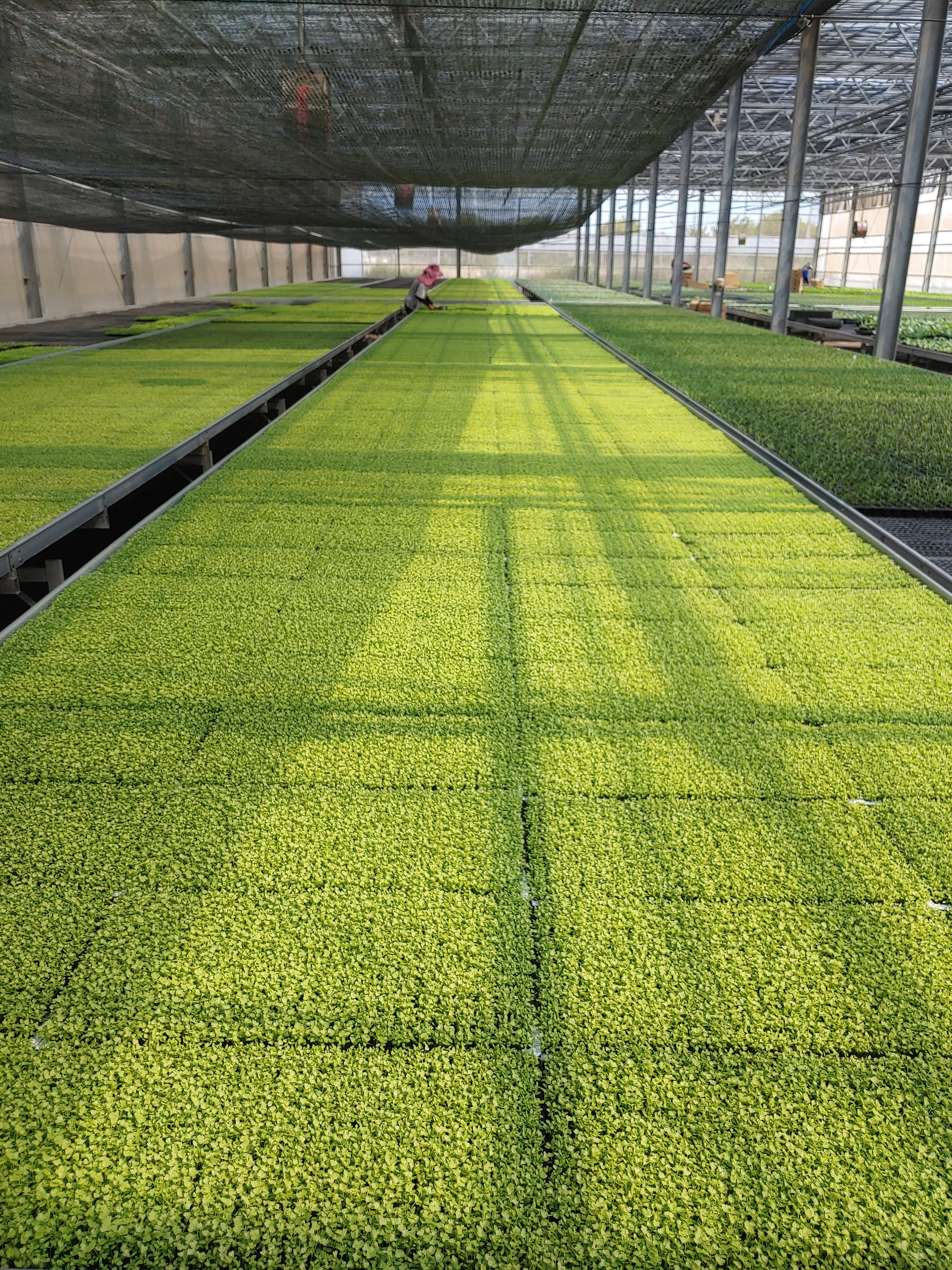Author:Yi-lung Chang*1, Yu-Ching Tsai*2, Yu-Guang Hseuh*3, Ting-Lin Chang*4
*1Assistant Researcher of Taiwan Seed Improvement and Propagation Station
*2Associate Researcher of Taiwan Seed Improvement and Propagation Station
*3Retired Associate Researcher of Taiwan Seed Improvement and Propagation Station
*4Director of Taiwan Seed Improvement and Propagation Station
There are 150 thousands hectors fields growing vegetables in Taiwan recent years. In order to reduce the farming risks and shorten the production periods, farmers utilize seedlings from professional nursery farms. These crops include cabbages, cauliflowers, tomatoes, sweat peppers and bitter gourds and so on, almost over 40 percent of the growing area. The industry of nursery farms have been well developed since 1992 while the government induced the automatic nursery production system using plug tray to grow seedlings and promoted this tech to public. Because of the plant nature, the germination rate of seeds and the vigor of seedlings are not 100% perfect. The nursery farms will have to prepare more seedlings over the original orders. Meanwhile, the manipulation of taking orders mostly relies on single person in the farms. Therefore, the burden of this person is quite heavy and sometimes mistakes happened. To respond the sounds of searching improvement from nursery industry, the Intelligent Vegetable Seedling Production and Sale Management Network System has been developed by Taiwan Seed Improvement and Propagation Station (TSIPS) under the Smart Agriculture Program supported by Agriculture and Food Agency and The Council of Agriculture of the Executive Yuan.
The Intelligent Vegetable Seedling Production and Sale Management Network System is established based on the concept of Enterprise Performance Management (ERP). The system integrates the orders taking, seeds and seedlings management, workforce arrangement, product deliveries and accounting altogether. Last year the system had added the module of seedling nursery day’s prediction function and can be connected to the Line@ official account to integrate online ordering, and is mainly used in local seeds and pesticide stores which provide the service for small scale farming and home garden. In the beginning of inducing system, TSIPS will help the nursery farms review their whole production and sale progress, and teach them how re-organize their data. This is the key process which plays an important role in how smoothly the farms will migrant the original paper work to the system successfully or not. The consistent of the data can help the nursery farms stay on the top of operating situation immediately anytime.
 Fig. Integrated application of Line@ official account and the vegetable seedling production and sale management system
Fig. Integrated application of Line@ official account and the vegetable seedling production and sale management system'Nursery farms are all welcomed to utilize this system’ said by Dr. Chang Ting-Lin, the director of TSIPS. The training program of system utilizing had been held at least three times in 2022 and there will be more depending on the needs. Professional supports are provided anytime if farm owners are interested in utilizing this system. There are a few common reasons encouraging the nursery farms using this system. If the situation were similar to your nursery farms, you should call TSIPS without hesitation. ‘By inducing the system, the managers of nursery farms could handle the amount and growing stage of seedlings anytime, hence, they could easily rearrange the production and reduce the loss of seedlings which was prepared in advance ’ said by associate researcher Tsai Yu-Ching, the project leader of this system development.
 Fig. Training workshops on utilizing the Intelligent Vegetable Seedling Production and Sale Management Network System at Taichung(left) and Chiayi(right)
Fig. Training workshops on utilizing the Intelligent Vegetable Seedling Production and Sale Management Network System at Taichung(left) and Chiayi(right)'I could not get exactly whole picture of sales until I used the system' said Mrs. Kou Yue-Ying, the owner of a vegetable nursery farm in Taiyuan. The day in a nursery farm is quite incensed while good weather meeting the right growing season. Over hundred thousands of seedlings would be shipped to customers in one day, in the mean time the empty space would have to be re-occupied by the new sow plug trays. Under the condition of keeping the original paper records, it took Mrs. Kou much time to collate data. After utilizing this system, Mrs. Kou could spare her time to focus on customer development and other aspects to running a nursery farm better.
 Fig. Good quality vegetable seedlings in Mrs. Kou’s vegetable nursery farm in Taiyuan.
Fig. Good quality vegetable seedlings in Mrs. Kou’s vegetable nursery farm in Taiyuan.'The biggest problem currently encountered by the seedling industry is blind production. Because the nursery farms cannot accurately predict how much can be produced, the residual stock rate would be high. One purpose of this system is to establish effective system for producers’ said by Mr. Wu Kuo-Cheng, the technical specialist from agriculture and food agency. This system has been adjusted several times after feedback from users. The management of the production and sales system is combined with the broadcast function of the communication software, in order to solve the problem of good quality seedlings in stock becoming residues and provide another way to obtain sales information for consumers.
Taiwan’s smart agriculture will enter the second stage in 2023, with “precision, collaboration, and popularization” as the development goal. The focus will fall on advancing innovative models for systems and developing facilities and equipment that are cost-effective, forward-looking, affordable, and of high-quality. TSIPS will continue to put efforts on collaboration between industries and local governments as well as international partners to facilitate the application of our results.